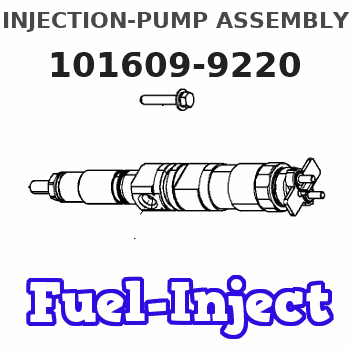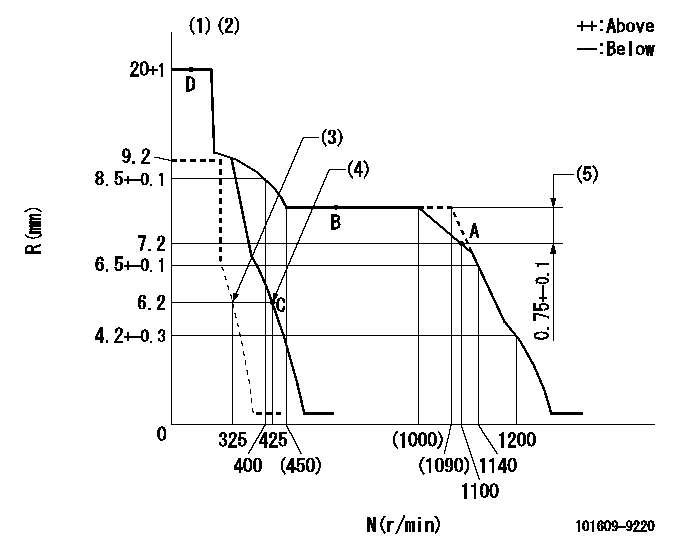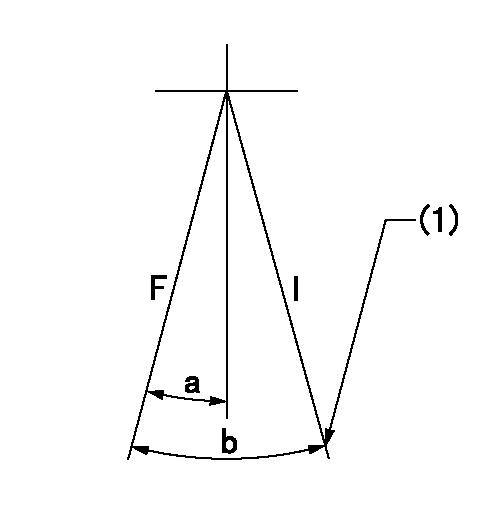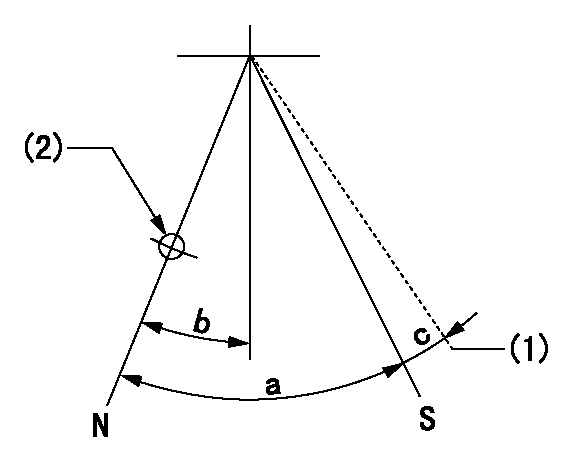Information injection-pump assembly
ZEXEL
101609-9220
1016099220
MITSUBISHI-HEAV
3436501050
3436501050

Rating:
Cross reference number
ZEXEL
101609-9220
1016099220
MITSUBISHI-HEAV
3436501050
3436501050
Zexel num
Bosch num
Firm num
Name
Calibration Data:
Adjustment conditions
Test oil
1404 Test oil ISO4113 or {SAEJ967d}
1404 Test oil ISO4113 or {SAEJ967d}
Test oil temperature
degC
40
40
45
Nozzle and nozzle holder
105780-8140
Bosch type code
EF8511/9A
Nozzle
105780-0000
Bosch type code
DN12SD12T
Nozzle holder
105780-2080
Bosch type code
EF8511/9
Opening pressure
MPa
17.2
Opening pressure
kgf/cm2
175
Injection pipe
Outer diameter - inner diameter - length (mm) mm 6-2-600
Outer diameter - inner diameter - length (mm) mm 6-2-600
Overflow valve
131424-5720
Overflow valve opening pressure
kPa
255
221
289
Overflow valve opening pressure
kgf/cm2
2.6
2.25
2.95
Tester oil delivery pressure
kPa
255
255
255
Tester oil delivery pressure
kgf/cm2
2.6
2.6
2.6
Direction of rotation (viewed from drive side)
Right R
Right R
Injection timing adjustment
Direction of rotation (viewed from drive side)
Right R
Right R
Injection order
1-5-3-6-
2-4
Pre-stroke
mm
3.7
3.65
3.75
Rack position
After adjusting injection quantity. R=A
After adjusting injection quantity. R=A
Beginning of injection position
Drive side NO.1
Drive side NO.1
Difference between angles 1
Cal 1-5 deg. 60 59.5 60.5
Cal 1-5 deg. 60 59.5 60.5
Difference between angles 2
Cal 1-3 deg. 120 119.5 120.5
Cal 1-3 deg. 120 119.5 120.5
Difference between angles 3
Cal 1-6 deg. 180 179.5 180.5
Cal 1-6 deg. 180 179.5 180.5
Difference between angles 4
Cyl.1-2 deg. 240 239.5 240.5
Cyl.1-2 deg. 240 239.5 240.5
Difference between angles 5
Cal 1-4 deg. 300 299.5 300.5
Cal 1-4 deg. 300 299.5 300.5
Injection quantity adjustment
Adjusting point
A
Rack position
7.2
Pump speed
r/min
1100
1100
1100
Average injection quantity
mm3/st.
42.3
41.3
43.3
Max. variation between cylinders
%
0
-3.5
3.5
Basic
*
Fixing the lever
*
Injection quantity adjustment_02
Adjusting point
-
Rack position
6.9+-0.5
Pump speed
r/min
425
425
425
Average injection quantity
mm3/st.
12
10.7
13.3
Max. variation between cylinders
%
0
-14
14
Fixing the rack
*
Remarks
Adjust only variation between cylinders; adjust governor according to governor specifications.
Adjust only variation between cylinders; adjust governor according to governor specifications.
Test data Ex:
Governor adjustment

N:Pump speed
R:Rack position (mm)
(1)Target notch: K
(2)Tolerance for racks not indicated: +-0.05mm.
(3)Set idle sub-spring
(4)Main spring setting
(5)Rack difference between N = N1 and N = N2
----------
K=11 N1=1100r/min N2=700r/min
----------
----------
K=11 N1=1100r/min N2=700r/min
----------
Speed control lever angle

F:Full speed
I:Idle
(1)Stopper bolt setting
----------
----------
a=12deg+-5deg b=19deg+-5deg
----------
----------
a=12deg+-5deg b=19deg+-5deg
Stop lever angle

N:Pump normal
S:Stop the pump.
(1)Hold the boss against the stop side
(2)Use the hole at R = aa
----------
aa=60mm
----------
a=53deg+-5deg b=26.5deg+-5deg c=(9deg)
----------
aa=60mm
----------
a=53deg+-5deg b=26.5deg+-5deg c=(9deg)
0000001501 I/P WITH LOAD PLUNGER ADJ
Load plunger-equipped pump adjustment
1. Adjust the variation between cylinders and the injection quantity.
2. At Full point A, adjust the pre-stroke to the specified value.
3. After pre-stroke adjustment, reconfirm that the fuel injection quantity and the variation between cylinders is as specified.
----------
----------
----------
----------
Timing setting

(1)Pump vertical direction
(2)Position of gear mark '3' at No 1 cylinder's beginning of injection
(3)B.T.D.C.: aa
(4)After adjusting the injection quantity, adjust at rack position bb.
----------
aa=6deg bb=7.2mm
----------
a=(110deg)
----------
aa=6deg bb=7.2mm
----------
a=(110deg)
Information:
Fuel Specifications
Types of Fuel
Caterpillar diesel engines have the ability to burn a wide variety of fuels. These fuels are divided into two general groups, preferred and permissible.The preferred fuels provide maximum engine service life and performance. They are distillate fuels. They are commonly called fuel oil, furnace oil, diesel fuel, gas oil or kerosene.The permissible fuels are crude oils or blended fuels. Use of these fuels can result in higher maintenance costs and reduced engine service life.Refer to Fuels for Caterpillar Diesel Engines, Form SEHS7067, for a detailed summary of preferred and permissible fuels and their specifications.Cetane Requirement
The minimum fuel cetane number recommended for the engine is 40.Fuel Cloud Point
Fuel waxing can plug the fuel filters in cold weather. The fuel cloud point must be below the temperature of the surrounding air to prevent filter waxing and power loss. Fuel heating attachments are available from your Caterpillar dealer to minimize fuel filter waxing.Fuel Sulfur Content
The percentage of sulfur in the fuel will affect the engine oil recommendations. If the fuel has over 0.5% sulfur content, the CD engine oil must have a TBN of 20 times the percentage of fuel sulfur (TBN as measured by the ASTM D-2896 method). Your oil supplier should be able to furnish the correct oils.Coolant Specifications
Always use coolant conditioner elements. Never use plain water only.Do not use Caterpillar coolant system conditioner elements with Dowtherm 209 Full-Fill coolant. Follow the instructions provided with the Dowtherm 209 Full-Fill coolant.
Use a mixture of fill water and antifreeze, and a coolant conditioner element.Know Your Cooling System, Form SEBD0518, provides more detailed specifications.Fill Water
Acceptable water for use in the ethylene glycol-type antifreeze and water mixture is shown on the chart below: Antifreeze
Use ethylene glycol-type antifreeze. Use the correct amount to provide freeze protection to the lowest expected outside temperature.Coolant Conditioner Elements
Coolant conditioner elements should be used to maintain a 3% to 6% concentration of conditioner in the coolant. Use a precharge element when filling the complete system, or changing coolant. Install a new maintenance element every 250 service hours during operation. Contact your Caterpillar dealer for the correct coolant conditioner element.Lubricant Specifications
The abbreviations listed below follow S.A.E. J754 nomenclature. The classifications follow S.A.E. J183 classifications. The MIL specifications are U.S.A. Military Specifications. These definitions will be of assistance in purchasing lubricants. The recommended oil viscosities for this machine are found on the "Recommended Lubricant Viscosities" Chart.Engine Oils (CD)
Use oils that meet Engine Service Classification CD (MIL-L-2104C).Consult the EMA Lubricating Oil Data Book, Form SEBU5939, for a listing of CD oil brands.The percentage of sulfur in the fuel will affect the engine oil recommendations. If the fuel has over 0.5% sulfur content, the CD engine oil must have a TBN of 20 times the percentage of fuel sulfur (TBN as measured by the ASTM D-2896 method). Your oil supplier should be able to furnish the correct oils.
Types of Fuel
Caterpillar diesel engines have the ability to burn a wide variety of fuels. These fuels are divided into two general groups, preferred and permissible.The preferred fuels provide maximum engine service life and performance. They are distillate fuels. They are commonly called fuel oil, furnace oil, diesel fuel, gas oil or kerosene.The permissible fuels are crude oils or blended fuels. Use of these fuels can result in higher maintenance costs and reduced engine service life.Refer to Fuels for Caterpillar Diesel Engines, Form SEHS7067, for a detailed summary of preferred and permissible fuels and their specifications.Cetane Requirement
The minimum fuel cetane number recommended for the engine is 40.Fuel Cloud Point
Fuel waxing can plug the fuel filters in cold weather. The fuel cloud point must be below the temperature of the surrounding air to prevent filter waxing and power loss. Fuel heating attachments are available from your Caterpillar dealer to minimize fuel filter waxing.Fuel Sulfur Content
The percentage of sulfur in the fuel will affect the engine oil recommendations. If the fuel has over 0.5% sulfur content, the CD engine oil must have a TBN of 20 times the percentage of fuel sulfur (TBN as measured by the ASTM D-2896 method). Your oil supplier should be able to furnish the correct oils.Coolant Specifications
Always use coolant conditioner elements. Never use plain water only.Do not use Caterpillar coolant system conditioner elements with Dowtherm 209 Full-Fill coolant. Follow the instructions provided with the Dowtherm 209 Full-Fill coolant.
Use a mixture of fill water and antifreeze, and a coolant conditioner element.Know Your Cooling System, Form SEBD0518, provides more detailed specifications.Fill Water
Acceptable water for use in the ethylene glycol-type antifreeze and water mixture is shown on the chart below: Antifreeze
Use ethylene glycol-type antifreeze. Use the correct amount to provide freeze protection to the lowest expected outside temperature.Coolant Conditioner Elements
Coolant conditioner elements should be used to maintain a 3% to 6% concentration of conditioner in the coolant. Use a precharge element when filling the complete system, or changing coolant. Install a new maintenance element every 250 service hours during operation. Contact your Caterpillar dealer for the correct coolant conditioner element.Lubricant Specifications
The abbreviations listed below follow S.A.E. J754 nomenclature. The classifications follow S.A.E. J183 classifications. The MIL specifications are U.S.A. Military Specifications. These definitions will be of assistance in purchasing lubricants. The recommended oil viscosities for this machine are found on the "Recommended Lubricant Viscosities" Chart.Engine Oils (CD)
Use oils that meet Engine Service Classification CD (MIL-L-2104C).Consult the EMA Lubricating Oil Data Book, Form SEBU5939, for a listing of CD oil brands.The percentage of sulfur in the fuel will affect the engine oil recommendations. If the fuel has over 0.5% sulfur content, the CD engine oil must have a TBN of 20 times the percentage of fuel sulfur (TBN as measured by the ASTM D-2896 method). Your oil supplier should be able to furnish the correct oils.